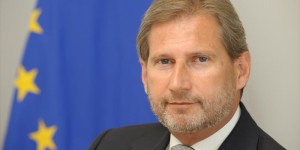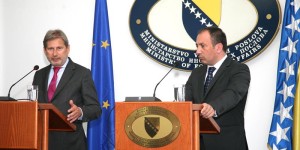29 May 2014
President Novković, members of the High Judicial and
Prosecutorial Council of Bosnia and Herzegovina, and its Secretariat,
distinguished colleagues, ladies and gentlemen:
It is – also
personally – a great pleasure and an honour to congratulate the HJPC on
the occasion of its 10th anniversary. We are not here to applaud the
fact that this strategically vital institution has worked already so
long. Rather it is its many achievements, which we are here to celebrate
and which we should not take for granted.
Let me first take a
small step back to note where we started. Back in 2003, the EU
conditioned the opening of SAA negotiations to the establishment of the
single state-wide HJPC. Why was it so important to us? For two
strategic reasons:
First, the EU and the international community was
– and remains – convinced that such an institution is needed to further
strengthen the democratic principles of an independent, effective,
efficient and professional judicial system. Second, such standards are a
fundamental requirement for any country aspiring to become a member of
the European Union.
Reflecting our conviction about the core
importance of a unified state-wide HJPC, after its establishment, we
committed and engaged in one of the most long term as well as
successful institution building exercises in the country – and dare I
say – in the Western Balkans region.
Jointly with our partners
from Norway, the United Kingdom, the Kingdoms of Sweden and the
Netherlands we have provided significant financial support to the
justice sector in general and to the HJPC in particular to create a more
efficient and professional court and prosecutorial system.
The HJPC had a very positive impact in terms of significantly reforming the judiciary throughout the country.
While
the situation has greatly improved since the establishment of the
single state-wide HJPC, I believe that we are also all aware that
extensive challenges remain. These affect all transition countries – but
are even more pronounced in Bosnia and Herzegovina.
The complex system means that in BiH there are many conflicting views over the steps necessary to reform the justice sector.
The
EU-BiH Structured Dialogue on Justice was created as a long term
platform to address all these concerns and possible divergences, while
channelling them through a constructive mutual dialogue. This has
allowed a careful contextualisation of the judicial reform process in
Bosnia and Herzegovina. On one hand the Structured Dialogue has clearly
identified standards, best practices and stringent demands when it comes
to the EU integration process and the rule of law. On the other hand we
have to find ways of transposing and translating them into the
particularly complex constitutional, historical and political context of
the country.
This marriage of improving standards in Bosnia and
Herzegovina on one hand and on the other hand facing the country’s
particular context – has led to vital discussions on priority reforms in
the key area of independence, effectiveness, efficiency and
accountability of the judiciary.
Please allow me to say couple
of words on each of this. On the key issue of the judiciary’s
independence, the European Union declared, already in December 2012,
that the institutional independence of the justice sector and therefore
the HJPC is secured and that, while revision and amelioration are
welcomed and continuously needed, structural reforms looking at
reintroducing a role for the executive and/or the legislative in
processes of selection and/or appointment of judicial offices would
represent a clear setback to a successful reform.
It must also
be recognised that the accountability principle, which is a corollary to
independence, requires a higher level of attention than it was the case
up until now. The most recent recommendations of the Structured
Dialogue particularly stress the need to regulate the issues of conflict
of interest in the judiciary, while the institutional position of the
disciplinary prosecutor must be thoroughly reviewed in order to build a
solid track record of disciplinary cases.
And finally, when it
comes to efficiency and effectiveness: while we have seen some key
achievements, much remains to be done to, for example, improve the
investment environment and stimulate economic growth. This implies more
effective adjudication and enforcement of commercial cases, as well as
harmonisation of legislation and jurisprudence as to ensure greater
equality of citizens before the law.
Similarly, the EU would
wish to see a better track record in tackling high profile corruption
and organised crime cases – which so far is missing. As well as to see
Bosnia and Herzegovina close the painful chapter of the region’s largest
war crimes cases backlog.
Ladies and gentlemen, the European future
of Bosnia and Herzegovina is a reality. But if we are to look at a
successful EU integration for the country, this means that the country
and its judicial authorities at all levels will have to greatly speed up
current reform processes.
This is a long, complex and
time-demanding task – which we are committed to tackle with you. Whether
through IPA or the Structured Dialogue, we will put means and processes
at your disposal to progress further.
But ultimately the delivery
will continue to rely on all the members of the judiciary to ensure the
reforms are fully implemented – and on the government to provide the
adequate budgetary support and assurance of the judiciary’s
independence.
I would like to conclude my remarks by saying once
more there are many reasons to celebrate. The past ten years have been a
successful and impressive journey for Bosnia and Herzegovina’s
judiciary, also in comparison to the region –and it was great to be your
partner in the process.
On that note, I would like to express my
sincere gratitude to President Novkovic, who will hand over his
position in a few weeks, his Council Colleagues and the highly
professional HJPC staff. While a great deal remains to be done, without
the HJPC, the judiciary in BiH would be at very different level than it
is today.
Thank you very much.



